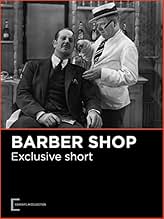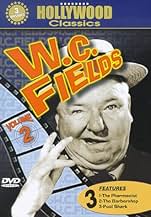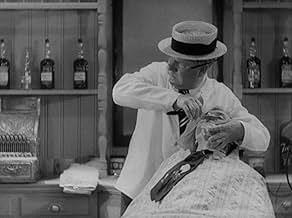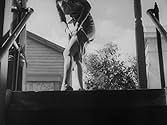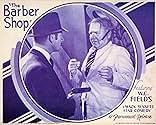Ajouter une intrigue dans votre langueAn inept barber maintains his good-humored optimism in his small town shop despite having a hen-pecking harridan for a wife and a total lack of tonsorial skill.An inept barber maintains his good-humored optimism in his small town shop despite having a hen-pecking harridan for a wife and a total lack of tonsorial skill.An inept barber maintains his good-humored optimism in his small town shop despite having a hen-pecking harridan for a wife and a total lack of tonsorial skill.
John Sinclair
- Mr. Flugg
- (as John St. Clair)
Frank Alexander
- Steam Room Victim - Before
- (non crédité)
Billy Bletcher
- Steam Room Victim - After
- (non crédité)
Joe Bordeaux
- Passerby
- (non crédité)
Harry Bowen
- Cop
- (non crédité)
Joe Calder
- Passerby
- (non crédité)
Julia Griffith
- Mrs. Scroggins - Passerby
- (non crédité)
Fay Holderness
- Little Girl's Mother
- (non crédité)
George Humbert
- Jose
- (non crédité)
William McCall
- Man with Horse
- (non crédité)
Gloria Velarde
- Gloria - Little Girl in Barber's Chair
- (non crédité)
Frank Yaconelli
- Italian Man Selling Bass Fiddle
- (non crédité)
Avis à la une
Personally, I like Fields' features much more than the few short films he made. The Bank Dick, You Can't Cheat an Honest Man, You're Telling Me, The Old-Fashioned Way, It's a Gift, Never Give a Sucker an Even Break, and The Man on the Flying Trapeze are some of the funniest films you're ever likely to see. But most of his shorts are somewhat lame. My favorite is The Golf Specialist, which is nothing more - nor should it be - than Fields' infamous vaudeville routine. The Dentist is famous for its sexual innuendo of the woman wrapping her legs around Fields while he pulls a tooth, but it's not very funny after that. The Barber Shop is the second funniest of these shorts. Fields is very funny in it, and so are the supporting cast members. Here Fields is in henpecked husband mode, taking it from his evil vegetarian wife. His little son likes to tell him the lamest riddles in history. The slight plot is a prelude to The Bank Dick, with a criminal on the run and Fields bragging that he'd throttle him good if he got a hold of him. A lot of good jokes here. See it on the Criterion disc of his short films. 8/10.
Although he usually gets high marks for being funny, W.C. Fields seldom gets credit for versatility. Even people familiar with his work tend to define his screen persona narrowly as a cantankerous, lecherous old blow-hard who hates kids and dogs, and is usually drunk. This image was firmly ingrained in the public imagination during the late 1930's and '40s through his radio work and most of his later movie appearances, but a look back at the films he made in the early to mid-'30s reveals distinct variations in his roles. He was capable of a surprising range of nuance, and was not at all a Johnny One Note who could only play "W.C. Fields" over and over.
As evidence of this, consider the four short films Fields made for producer Mack Sennett during the 1932-33 season. Three of the four bear certain similarities, each presenting our hero in the role of middle-class professional man: dentist, pharmacist, and barber. Each character lives over his place of business, and each has difficulties with his family and his customers, but beyond the superficial similarities there are decided shades of difference in Fields's portrayals. In The Dentist he is ornery, mean to his daughter, and openly contemptuous towards his patients. In The Pharmacist he's once more a petty tyrant when dealing with his family, but on the job he's ridiculously agreeable and positively masochistic in his desire to please his customers. In The Barber Shop, his last Sennett comedy, Fields is downright mellow, and the atmosphere is more laid-back and whimsical than in the other films.
Fields plays Cornelius O'Hare, barber of Felton City. ("Felton" was the maiden name of Fields' mother, and it's said that his mumbling delivery of wisecracks, as demonstrated in the opening scene, owed a lot to his mother's personal style.) O'Hare likes to hang out in front of his shop and shoot the breeze. His business is struggling and his wife is a nag, but his life has its compensations: he has a friendly relationship with his son, who likes to tell riddles, and gets to flirt with an attractive young manicurist named Hortense who works in his shop and seems to like him. During the course of the film we follow O'Hare through his dealings with difficult customers and various passersby. We learn that O'Hare is not a very good barber -- to put it politely -- but he seems to be a decent enough guy. And when his day ends in a humiliating encounter with a bank robber, we feel a little sorry for him.
The Barber Shop may not be the funniest short Fields ever made, but there are laughs throughout, and you'll seldom find him as sympathetic as he is here. I especially enjoy the surreal touches, such as the steam room that reduces an obese man to a skinny one in a matter of minutes, and the climactic gag involving O'Hare's bass fiddle. These wacky gags, in combination with Fields' more benign persona, make this one of The Great Man's most pleasant comedies, one that might win over non-fans who are put off by his nastier characterizations in other movies.
Released during the Depression summer of 1933, The Barber Shop holds a melancholy place in Hollywood history: according to Simon Louvish's biography of Mack Sennett, this was the last film put out by Sennett's studio before it went into bankruptcy and was forcibly closed. Sennett had been in business as a producer since he founded Keystone in 1912, and although he managed to limp along with minor projects for another year or two this pretty much marked the end of the line for him. Sad, but at least Mack was able to finish his career on a high note, thanks to Mr. Fields.
As evidence of this, consider the four short films Fields made for producer Mack Sennett during the 1932-33 season. Three of the four bear certain similarities, each presenting our hero in the role of middle-class professional man: dentist, pharmacist, and barber. Each character lives over his place of business, and each has difficulties with his family and his customers, but beyond the superficial similarities there are decided shades of difference in Fields's portrayals. In The Dentist he is ornery, mean to his daughter, and openly contemptuous towards his patients. In The Pharmacist he's once more a petty tyrant when dealing with his family, but on the job he's ridiculously agreeable and positively masochistic in his desire to please his customers. In The Barber Shop, his last Sennett comedy, Fields is downright mellow, and the atmosphere is more laid-back and whimsical than in the other films.
Fields plays Cornelius O'Hare, barber of Felton City. ("Felton" was the maiden name of Fields' mother, and it's said that his mumbling delivery of wisecracks, as demonstrated in the opening scene, owed a lot to his mother's personal style.) O'Hare likes to hang out in front of his shop and shoot the breeze. His business is struggling and his wife is a nag, but his life has its compensations: he has a friendly relationship with his son, who likes to tell riddles, and gets to flirt with an attractive young manicurist named Hortense who works in his shop and seems to like him. During the course of the film we follow O'Hare through his dealings with difficult customers and various passersby. We learn that O'Hare is not a very good barber -- to put it politely -- but he seems to be a decent enough guy. And when his day ends in a humiliating encounter with a bank robber, we feel a little sorry for him.
The Barber Shop may not be the funniest short Fields ever made, but there are laughs throughout, and you'll seldom find him as sympathetic as he is here. I especially enjoy the surreal touches, such as the steam room that reduces an obese man to a skinny one in a matter of minutes, and the climactic gag involving O'Hare's bass fiddle. These wacky gags, in combination with Fields' more benign persona, make this one of The Great Man's most pleasant comedies, one that might win over non-fans who are put off by his nastier characterizations in other movies.
Released during the Depression summer of 1933, The Barber Shop holds a melancholy place in Hollywood history: according to Simon Louvish's biography of Mack Sennett, this was the last film put out by Sennett's studio before it went into bankruptcy and was forcibly closed. Sennett had been in business as a producer since he founded Keystone in 1912, and although he managed to limp along with minor projects for another year or two this pretty much marked the end of the line for him. Sad, but at least Mack was able to finish his career on a high note, thanks to Mr. Fields.
With the great W.C. Fields in fine form, and a setup that provides him with a lot of good material, "The Barber Shop" is a very enjoyable short comedy. It is filled with the kinds of details and subtle gags that make Fields's comedies worth watching attentively.
"The Barber Shop" closely resembles the Fields feature "The Pharmacist", with very similar settings and stories. Both are very good, and in both of them Elise Cavanna is funny as the domineering wife of Fields's character. Both have some gags that are deliberately absurd, and others that are less obvious. Both feature amusing exchanges between Fields and numerous customers.
When Fields was at his best, he could really get across the wackiness of so much of what happens in daily life, and that's one of the things that works quite well here.
"The Barber Shop" closely resembles the Fields feature "The Pharmacist", with very similar settings and stories. Both are very good, and in both of them Elise Cavanna is funny as the domineering wife of Fields's character. Both have some gags that are deliberately absurd, and others that are less obvious. Both feature amusing exchanges between Fields and numerous customers.
When Fields was at his best, he could really get across the wackiness of so much of what happens in daily life, and that's one of the things that works quite well here.
Another dose of madness from W. C. Fields, this short sees him playing the part of Cornelius O'Hare, small-town barber with a cutting observation for all who pass his path. Fields comes up with a number of gags that possibly only he would dream up, whether its testing the sharpness of a razor on his tongue, playing a bass fiddle in his own inimitable way, or shaving a hapless customer with all the delicacy of a blind man painting a barn door. This forms a loose trio with The Dentist and The Pharmacist, which Fields also made for Mack Sennett, and all of which present the comedian at the height of his talent although this one is perhaps the weaker of the three.
W. C. Fields had done a few silent shorts in the "teens" but it really did take sound to capture him at his best. He is not only a physical comedian, capable of broad slapstick, he is one of the best verbal comedians around, especially when allowed to ad-lib, as he does here. The story follows the adventures of barber Cornelius O'Hare through his extremely busy day. It has the look of a vaudeville routine, which no doubt it was based on. Fields' almost constant patter makes all his movies worth rewatching, just to catch his subtle remarks, often made under his breath and very quickly. I have read that, at the beginning of the short, as Fields is sitting out front of his shop, making rude comnents about people as they go by, that this is a tribute to his mother, who acted just like this as Fields was a boy, commenting cuttingly on the neighbors. If you like sardonic humor, Fields is the man for you. Recommended highly along with any of his other shorts as in these shorter films, much more is packed in and nothing is allowed to lag.
Le saviez-vous
- AnecdotesThis film is included on "W.C. Fields - Six Short Films", which is part of the Criterion Collection, spine #79.
- Citations
Cornelius O'Hare: I'm the worst barber in town, my wife can tell you that.
- ConnexionsEdited into W.C. Fields: 6 Short Films (2000)
Meilleurs choix
Connectez-vous pour évaluer et suivre la liste de favoris afin de recevoir des recommandations personnalisées
Détails
- Durée
- 21min
- Couleur
- Mixage
- Rapport de forme
- 1.37 : 1
Contribuer à cette page
Suggérer une modification ou ajouter du contenu manquant

